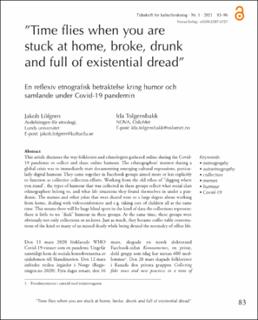| dc.contributor.author | Tolgensbakk, Ida | |
| dc.contributor.author | Löfgren, Jakob | |
| dc.date.accessioned | 2021-09-28T13:21:23Z | |
| dc.date.available | 2021-09-28T13:21:23Z | |
| dc.date.created | 2021-07-30T10:12:42Z | |
| dc.date.issued | 2021-07-27 | |
| dc.identifier.citation | Tidsskrift for kulturforskning. 2021, 1 83-96. | en_US |
| dc.identifier.issn | 1502-7473 | |
| dc.identifier.issn | 2387-6727 | |
| dc.identifier.uri | https://hdl.handle.net/11250/2784164 | |
| dc.description.abstract | This article discusses the way folklorists and ethnologists gathered online during the Covid-19 pandemic to collect and share online humour. The ethnographers’ instinct during a global crisis was to immediately start documenting emerging cultural expressions, particularly digital humour. They came together in Facebook groups aimed more or less explicitly to function as collective collection efforts. Working from the old ethos of ”digging where you stand”, the types of humour that was collected in these groups reflect what social class ethnographers belong to, and what life situations they found themselves in under a pandemic. The memes and other jokes that were shared were to a large degree about working from home, dealing with videoconferences and e.g. taking care of children all at the same time. This means there will be huge blind spots in the kind of data the collections represent: there is little to no ”dark” humour in these groups. At the same time, these groups were obviously not only collections or archives. Just as much, they became coffee table conversations of the kind so many of us missed dearly while being denied the normalcy of office life. | en_US |
| dc.language.iso | swe | en_US |
| dc.publisher | Novus forlag | en_US |
| dc.relation.ispartofseries | Tidsskrift for kulturforskning;Nr 1 (2021) | |
| dc.relation.uri | http://ojs.novus.no/index.php/TFK/issue/view/238 | |
| dc.rights | Navngivelse 4.0 Internasjonal | * |
| dc.rights.uri | http://creativecommons.org/licenses/by/4.0/deed.no | * |
| dc.subject | Covid-19 | en_US |
| dc.subject | Humor | en_US |
| dc.subject | Humour | en_US |
| dc.subject | Autoetnografi | en_US |
| dc.subject | Autoethnography | en_US |
| dc.subject | Netnografi | en_US |
| dc.subject | Netnography | en_US |
| dc.subject | Memes | en_US |
| dc.subject | Collections | en_US |
| dc.subject | Samlinger | en_US |
| dc.title | ”Time flies when you are stuck at home, broke, drunk and full of existential dread”. En reflexiv etnografisk betraktelse kring humor ochsamlande under Covid-19 pandemin. | en_US |
| dc.title.alternative | ”Time flies when you are stuck at home, broke, drunk and full of existential dread” | en_US |
| dc.type | Peer reviewed | en_US |
| dc.type | Journal article | en_US |
| dc.description.version | publishedVersion | en_US |
| cristin.ispublished | true | |
| cristin.fulltext | original | |
| cristin.qualitycode | 1 | |
| dc.identifier.doi | http://ojs.novus.no/index.php/TFK/article/view/1980/1949 | |
| dc.identifier.cristin | 1923125 | |
| dc.source.journal | Tidsskrift for kulturforskning | en_US |
| dc.source.volume | 20 | en_US |
| dc.source.issue | 1-2 | en_US |
| dc.source.pagenumber | 83-96 | en_US |
| dc.subject.nsi | VDP::Folkloristikk, etnologi: 100 | en_US |
| dc.subject.nsi | VDP::Folklore studies, ethnology: 100 | en_US |

